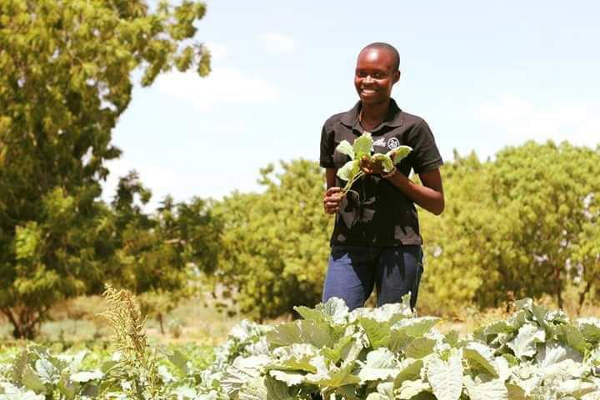
“When women are empowered and can claim their rights and success to land, leadership, opportunities and choices, economies grow, food security is enhanced and prospects are improved for current and future generations”, –Michelle Bachelet.
As the world marks the International Women’s Day, we remember the woman as a farmer for empowering the woman in the agricultural sector, is a step towards attaining food security and achieving zero hunger.
Epuri Lebasha, an agricultural engineer with a foundation in Agricultural science from the EARTH University in Costa Rica is the farmer shifting the narrative for farming in arid and semi-arid lands. She one day envisions a Northern Kenya that will step into the limelight to embrace as well as invest in agronomics.
“Farming is done in small slots and farmers mostly work in groups while utilizing the green houses, open field and shade nets as farming methods. The best thing about this is that, the supplies and produce goes to the local markets within Turkana. An achievement I am greatly proud of”, she says. Her motivation lies in seeing a food security for nomadic communities since they enormously depend on relief food distributed by NGOs and other donors. Her beliefs are deeply rooted in the nomadic communities to be able to grow their own food through the integration of nomadic practice and agriculture. An idea that is clearly seeing the daylight as days go by thanks to her efforts. This was also the underlying reason that pushed her to study in EARTH University.
The journey has not been a walk in the park. Some of the challenges faced include: being that it is a nomadic community in agricultural transition, sharing knowledge may prove to be a challenge since at times they prioritize livestock over agricultural crop production. There are also limited resources for the farmers to work with especially agro-inputs. She says efforts though have been put in place to change the mentality towards agricultural crop production among the pastoralists.
“Africa Farmers Club has had quite an impact”, she says. She draws her motivation from the organization since it encourages young farmers through expertise, exhibiting failures in farming and what experiences and lessons to be gained by presenting a learning opportunity.
It will be no shock to see the Northern Kenya region producing the greenest most leafy farm produce hence changing the debate about food security in the area by increasing yields and boosting the farmers’ profits.
“Farming isn’t just a way to make a living. It is a way to make a life. I started farming in 2015 and everyday has been an experience of its own. Setbacks have been there, and the worst was when I had been promised a profit of 5M from planting onions only to get KSh.119000. Honestly, I got sick and was admitted for an illness I am yet to discover. Since that day I got shock absorbers and if that never took me down, then nothing will”, she said amidst a laugh.
For Catherine, her gender has never deterred her from her goals. At first, she would strike you as a silent lady, but you would be shocked when she gives orders and takes charge in her farm. The boss in her comes to life at the farm. “You have to be strict and firm when giving instructions especially if you are a young lady with men working in your farm. Its either they do it your way or they leave”, she added.
Though she comes from a family with zero farming backgrounds, she has managed her farming business and is the talk of the town for her RIVER VIEW farm is quite remarkable. At barely 30 years, Catherine grows a wide variety of crops ranging from kales, cabbages, watermelons, tomatoes and capsicums. Together with her best friend Sylvia who is also her partner in the farm, they are a role model to the today’s woman
“Quitting my office job for the farm has been one of those choices I look back at and smile. Yes, people called me crazy and if that is being crazy then officially I am crazy. Many ask if I ever regret it and I gladly tell them not even a single day. For me the farm is everything. There is some certain joy in watching your seeds sprout from the ground and moving with them till you harvest. Catherine has taught me so much that I needed to learn and everyday has been a learning day”, She told me as she gave me a tour of the farm.
With the decision made to venture into the agricultural field, Sylvia went out to look for a farm and after many consultations, she found a home at the banks or River Maragwa, Murang’a county. The discouragement they received from the people in the community was reason enough to work hard at all costs just to prove them wrong. Being a young woman farming in an area that was dominate by men was not easy and with time, they have become the darlings of the village.
Sylvia believes that women have a great potential, but they must break the notion that they are an inferior gender.” It is all about believing in yourself and self-determination. If only women viewed themselves as experts who possess knowledge which compliments expert’s formal knowledge and not as mere beneficiaries, then we would be far”, she concluded.
As a society, it is our responsibility to make sure the next generation of women are educated, encouraged and empowered to take on the challenges of meeting the world’s growing food and fuel needs.

Jina
21/11/2022I enkoy wht you guyys aare uaually up too. Suuch ckever wwork and coverage!
Keeep up tthe verry good worjs guys I’ve included
you guyys to blogroll.
my webpabe 398